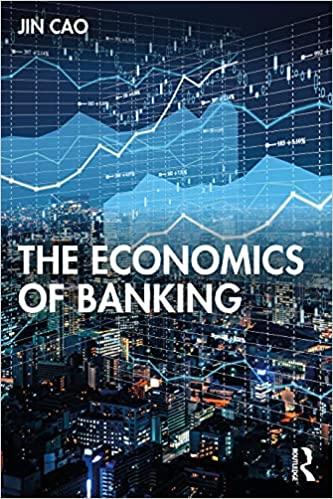Consider an economy with politicians, voters, and a bank.Following the argument of the Nordhaus-MacRae model that politicians
Question:
Consider an economy with politicians, voters, and a bank.Following the argument of the Nordhaus-MacRae model that politicians conduct credit policy through the bank under their control prior to elections, in order to stimulate the economy and win votes from myopic voters whose support for the incumbent politician increases with the economic performance.
The bank is a standard intermediary that earns a revenue of \(\Pi_{t}\left(L_{t}\right)\) from lending \(L_{t}\) in year \(t\), and incurs a funding \(\operatorname{cost} C_{t}\left(L_{t}\right) . \Pi_{t}\left(L_{t}\right)\) is increasing in \(L_{t}\) and strictly concave; \(C_{t}\left(L_{t}\right)\) is increasing in \(L_{t}\) and strictly convex:
\[\Pi_{t}^{\prime}\left(L_{t}\right)>0, \Pi_{t}^{\prime \prime}\left(L_{t}\right)<0, C_{t}^{\prime}\left(L_{t}\right)>0 \text {, and } C_{t}^{\prime \prime}\left(L_{t}\right)>0 \text {. }\]
Assume that a politician is a "semi" benevolent social planner such that she strives to maximize a social welfare function that includes her own political benefit; that is, her utility in year \(t\) is captured by
\[u_{P}=\psi\left(L_{t}\right)+t_{t} \phi\left(\xi\left(\psi\left(L_{t}\right)\right)\right)+\Pi_{t}\left(L_{t}\right)-C_{t}\left(L_{t}\right)\]
in which \(t_{t}\) is an indicator that \[l_{t}= \begin{cases}1 & \text { if } t \text { is election year } \\ 0 & \text { otherwise }\end{cases}\]
\(\psi\left(L_{t}\right)\) denotes GDP under credit supply \(L_{t}\) with \(\psi^{\prime}\left(L_{t}\right)>0, \xi(\cdot)\) denotes the politician's expected vote share after implementing the credit policy with \(\xi^{\prime}(\cdot)>0\), and \(\phi(\cdot)\) denotes the politician's political benefit with \(\phi^{\prime}(\cdot)>0 . \psi(\cdot), \phi(\cdot)\), and \(\xi(\cdot)\) are all continuous functions.
(a) Show that a "totally" benevolent social planner, i.e., a politician that does not consider her political benefit, chooses higher credit supply, call it \(L_{t}^{S}\), than the bank's efficient credit supply.
(b) Show that a politician as a "semi" benevolent social planner chooses her credit supply, call it \(L_{t}^{P}\), with \(L_{t}^{P}-L_{t}^{S}=\Delta L>0\) in an election year.
(c) Suppose that the politician is only reelected if she wins a vote share \(\xi\) higher than a threshold \(\bar{\xi}\); as a result, the marginal political benefit \(\phi^{\prime}(\cdot)\) is the highest around the neighborhood of \(\bar{\xi}\). Show that a winning politician maximizes \(\Delta L\).
Step by Step Answer:






